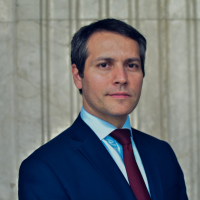Going Digital: The Future of Digital Trade in Latin America
As the world’s wealthiest countries lift pandemic restrictions, the crisis is worsening in much of Latin America due to slow vaccine rollout, stressed healthcare systems and more contagious variants. In response, many governments have re-imposed social distancing measures, once again redirecting social and economic activity online. Throughout the pandemic, the use of digital technologies in Latin America has rapidly accelerated: education has become entirely virtual in many countries, businesses have turned to cloud technologies to operate digitally, e-commerce has exploded and millions of consumers have experimented with financial technologies for the first time.
Nonetheless, Latin American governments must overcome major obstacles to reap the full benefits of digitalization. A significant challenge is a digital divide that has left many rural and low-income households with limited access to distance learning, telemedicine and banking services. Countries must also modernize regulatory systems to promote innovation while protecting privacy and safeguarding cybersecurity. A shortage of digital talent also threatens to slow progress. If governments can overcome these barriers, however, digitalization would accelerate pandemic recovery and help address structural challenges by diversifying economic activity and expanding access to critical goods and services.
This event is part of the “Going Digital” series. To learn more, see our content below:
Latin America's Digital Divide: Overcoming Persistent Gaps
Uruguay’s Technology Sector and the Future of Fintech in Latin America
Going Digital: Latin America’s Digital Workforce
Going Digital: Privacy & Cybersecurity in Latin America
Getting Closer to Distance Learning: Online Education in Latin America
Selected Quotes
Rodrigo Yáñez
"I think people have realized that, throughout the pandemic, internet and what they do over the internet to consume, to work, to study, to learn, has turned absolutely essential, and the role of governments is to provide rules for that activity to flourish, to feel safe, and to have some minimal certainty over time."
"We have a good opportunity to do something similar [to the free trade agreements of the 90s] when going digital. And to launch an initiative that is for the Americas, thinking [of] the digital economy, and in that sense […] build on top of the principles and the content of the DEPA Agreement, or the Digital Regional Market of the [Pacific Alliance]. But certainly, there is a chance for leaders to exchange different views [and] ideas, to agree on a roadmap where we can all facilitate cross-border transactions, and that we can recognize and make it interpretable and really facilitate the lives of our business, of our women doing business.[…] What we have done in these agreements that I mentioned—that’s the reason why IT services exports are projected to grow because of expanding digital trade relations under these agreements."
"I think there are [a] huge number of consumers in the [Latin American] region that could be better served through e-commerce and digital economy. I think that is what, as governments, we should keep doing. To think of this as an equal system that has different players, that have different needs, and to whom we should be responsive, and with a pragmatic yet flexible approach that can accommodate and adapt to the challenges of the future."
Martín Migoya
"Overall, I would say that what we’re seeing now is like a massive trend toward going direct to consumers. And that is triggering a huge demand on anyone that can provide [those] kind[s] of services, like Globant of course, and many other companies. But this trend is here to stay. Because it’s not just companies. It’s our companies, our governments, our institutions, no matter who you are talking with, they need to connect to consumers, with customers, with citizens, in a totally different manner. And this trend is also here to stay because people will start to work differently now, they will always need to come together to have great ideas. Zoom will not replace all of us being together in a single place going back and forth with an idea and creating something beautiful together. That will need to happen, but people will balance a lot more, the fact of going to the office, so on and so forth. And that creates another revolution that goes into education, that goes into how we connect with our employers, that goes into pretty much everywhere. So for me, I think that I’m stepped together with Globant in one of the largest opportunities that humankind saw in its history, which is the transformation of everything that used to be into how things are going to be."
"Our industry, as you may imagine, is an industry that is 25-75. You know, in terms of 25 [percent] women, 75 [percent] men. And we have huge work to do to put that even. And that needs to be done not just [by] training women into technology, but also promoting women into leadership positions, and we have a very specific commitment [at] Globant to a 50% mix on the top management of Globant by the end of 2025."
"I think the huge change that happened in the last, I would say, 10 years, is that the vision of entrepreneurs starting in Latin America is not any longer just local. It became global. And that’s a huge shift in the trend, and I think it’s very promising for what’s coming [to] Latin America in terms of new companies that would be created in the future."
María Inés Baqué
"The main change that [the] pandemic COVID-19 taught us, was that our response as consumers—the consumer behavior—has changed dramatically. Really really impressive. Why? Because it’s like we have broke[n] down all the barriers and all the fears people have in order to adopt digital tools. It was amazing to see, for example, elder people accustomed to use, maybe, the cellular phone, or maybe the PC at home, trying to, for example, set an appointment with the medical service or maybe acquiring their medicines, or doing the daily shopping by the device."
"Those countries, those organizations, those governments that were already using cloud services demonstrated that they were well or better prepared than others to react quickly, to react with speed, to react with scale. The learning from that is that cloud technologies are an enabler for digital services for [the] government."
"In terms of digital divide, the good news is that [the] private sector, also governments, are pretty aware that this is something we need to solve and this is something that we need to solve jointly. So, let’s do that, let’s concentrate on the connectivity, let’s concentrate on the access to devices—that is something [that’s] also important. And in the sense of the taxes that you apply, in the sense of how open is your market to receive the latest technologies, how to use the cloud in order to leapfrog the technology, how to use the new ways of communicating among ourselves. So, [there are] lots of things that governments can do."
This event is the third in a five-part series, “Going Digital,” co-sponsored by the Information Technology Industry Council (ITI), featuring senior public officials from across Latin America and executives from leading regional and global and technology companies exploring how Latin American governments could deepen the digital transformation.
Speakers



Moderator

Hosted By

Latin America Program
The Wilson Center’s prestigious Latin America Program provides non-partisan expertise to a broad community of decision makers in the United States and Latin America on critical policy issues facing the Hemisphere. The Program provides insightful and actionable research for policymakers, private sector leaders, journalists, and public intellectuals in the United States and Latin America. To bridge the gap between scholarship and policy action, it fosters new inquiry, sponsors high-level public and private meetings among multiple stakeholders, and explores policy options to improve outcomes for citizens throughout the Americas. Drawing on the Wilson Center’s strength as the nation’s key non-partisan policy forum, the Program serves as a trusted source of analysis and a vital point of contact between the worlds of scholarship and action. Read more


Argentina Project
The Argentina Project is the premier institution for policy-relevant research on politics and economics in Argentina. Read more

